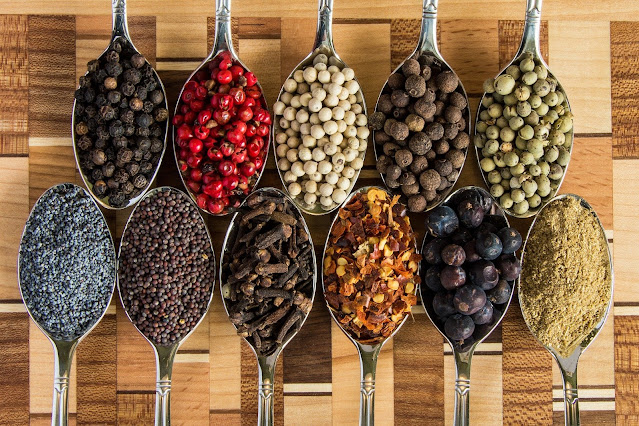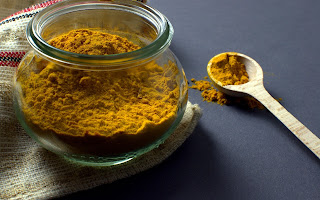Indian spices and herbs list you must know with health benefits
 |
| List of spices |
Spices
Spices are things that are very important in cooking. Without spices, cooked foods are not much taste. They play a significant role in our diet and have their health benefits. Most of the spices have an antioxidant effect, which is very important for our health. They can enhance the color, flavor, fragrance of the meals. The correct combination of the spices gives good taste, while an improper combination reduces its taste.
Fried spices have higher aroma and
flour. Also, fresh spices are better in smell and taste than processed and dry
once. Around the world, you can find many spices having a wide variety of flavor,
aroma, and flour.
list of common spices
Cinnamon
The true cinnamon refers to a Cinnamomum verum scientific term. This type is endemic to Sri Lanka, and another class is cassia cinnamon, which is not true cinnamon. Cinnamon is used to alcohol, chocolate, beverages, and dessert production to enhance the flavor and aroma. Also, use medicine. Cinnamon contains cinnamaldehyde and a high amount of antioxidants. So it can use as a natural food preservative. It has an anti-inflammatory effect, which reduces the risk of disease.
Cinnamaldehyde contains antibacterial and anti-fungal properties, which
help to fight against tooth decay and reduce infection. Also, this protects you
against cancer. If you use this daily, it will reduce the blood sugar level
while improving sensitivity to insulin. Also, this can lower LDL cholesterol
and triglyceride while increasing HDL cholesterol. By that, it cut the heart
disease.
Pepper
Pepper is referred to as Piper nigrum. There is various type of pepper, such as black pepper, white pepper, and green pepper. Black pepper is mature before the ripen fruit of the plat that is dry. Green pepper can be mature or immature but not dry. White pepper is a fully ripe fruit which removes pericarp. Pepper is native to south and Southeast Asia. It has a strong aroma and spiciness which can replace chili. Pepper is known as the ‘king of the spices.’ using pepper Pepper oil and oleoresins are extracted and marketed as value-added products. It has significant health benefits.
Pepper
contains piperine, which has high antioxidant properties that can protect your
cells from damage by free radicals. Not only that, but also it helps to control
sugar level in blood and has a cholesterol-lowering effect. Very importantly,
this has an active compound that can induce the death of cancer cells and
reduce the replication rate of cancer cells. Also, black pepper influence the absorption
of nutrients such as Selenium and Calcium.
It can increase the beneficial bacteria in the gut. Pepper can act as a
natural pain reliever.
Cardamom
Cardamom refers to as Elettaria cardamom. It is known as ‘Queen of the Spices.’ Cardamom is native to India, Pakistan, Nepal, Bhutan, Bangladesh, and Indonesia. It is the third place in the world’s most expensive spices, rich behind vanilla and saffron. It is a small spindle-shaped seedpod with a black color seed inside the pod. Cardamom is used to flavor the dishes.
It can mainly use in tea and coffee. Cardamom oil has antibacterial and
antimicrobial properties. Also, help to lower the blood pressure and have an effect
on the fight against cancer. Antioxidant compounds that it contain, prevents
the inflammation of the body. It can protect you against the digestive problem,
such as gastric ulcers. It can kill mouth bacteria and protect your mouth. It
stimulates oxygen uptake and reduces blood sugar levels.
Nutmeg and Mace
Nutmeg refers to as a Myristica fragrans. Nutmeg is the seed and mace, which is the red color net-like thing surrounded in the seed. Nutmeg and mace is used as a flavoring agent in many dishes. Also, use as ingredient to perfume and in medicine. Nutmeg butter, oleoresins and essential oil are the products of nutmeg. Nutmeg contains essential volatile oil such as myristcin, eugenol, safrole, elemicin.
nutmeg and mace has anti-inflammatory
properties, so they can reduce pain. It can induce sleep and de-stress your mind.
It helps digestion by treating diarrhea and bloating. It helps to stimulate nerves
in the brain and also an active ingredient to treat depression and anxiety. It improves
your skin by removing blackheads. Because it has anti- inflammatory and
anti-microbial effect. It has high mineral content, which regulates blood
circulation, blood pressure, and helps to relax blood vessels.
Ginger
Ginger is originated in south China and then spread into Asia, followed by the African continent. Ginger is the rhizome of the flowering plant. Most of time it is missed used as a root. It is used as the spice for food and flavor for the beverage. Ginger contains a chemical substance called gingerol. Ginger can use as oil, juice, fresh, dried, or as a powder. This gingerol has anti-inflammatory and antioxidant properties. It helps to prevent different types of nausea, and it relieves vomiting after surgeries and morning sickness. Also, it can reduce muscle pain. It can help with osteoarthritis because of its anti-inflammatory effect.
Ginger has potent
anti-diabetic properties, and it reduces the risk of heart disease. It is very
effective against menstrual pain. Ginger can lower LDL cholesterol and
triglyceride significantly. Also, gingerol can act against cancer.
Turmeric
Turmeric is
native to southwest India. It can grow in tropical climates. This is the
rhizome of the plant. It can be used as powder. When it is powdered, it becomes
a yellowish-orange color. It gives color
to the meals and adds flavor. The flavor is bitter and peppery and has an earthy
flavor. It has many health benefits. Turmeric rich in a compound known as curcumin, which helps to
treat depression and type 2 diabetes. It can fight against many viruses. It can
lower the LDL cholesterol, followed by reduces heart attack. It can ease
inflammation, joint pain, and thereby it treats arthritis. Turmeric can stop the
growth of tumor cells and detoxify enzymes. It is used as a treatment for
migraines.
Clove
Clove is the
unopened flower buds of an ever green tree. As a product clove, clove oil is
used. Clove has aromatic aroma and flavor. It is used in preparing curries,
meat, and marinades. Clove oil has medicinal value. Clove is ayurvedic medicine
to tooth decay and bad breath. It has a healing ability to minor cuts. Clove
tea can be used to relieve congestion. Clove oil is to reduce stretch marks,
relieve headaches. Clove improves the secretion of digestion enzymes, and it
reduces gastric irritability and nausea. Also, it can use to treat chronic
diarrhea.
Curry leaves
Curry leaves
are leaves that come from the curry tree. It is native Sri Lanka and India.
Curry leaves can be used as a flavoring and seasoning ingredient in cooking.
Curry leaves have many health benefits. Chemicals in the curry leaves can
regulate cholesterol levels in the body and help to weight loss. Carbazole
alkaloids are contained in curry leaves, which have anti-inflammatory,
antibacterial, and anti-cancer properties. Also, linolol which, can be found in
curry leaves, is responsible for its sent and have the bacterial killing
ability. Not only can that reduce blood glucose levels by protecting insulin-producing
cells. Curry leaves are rich in vitamin A which can improve your eyesight. It
can treat diarrhea and constipation. It can relieve morning sickness, vomiting,
and nausea.
What is the difference between whole spices and ground spices
 |
| whole nutmeg seeds and ground nutmeg |
Because whole spices keep their fragrant components considerably better than ground spices, cooking experts generally always advised purchasing whole spices and grinding them yourself. However, the majority of us rely on ground spices for convenience. Having a small supply of whole and ground spices that you'll use up fast can save a bunch of unused spices from rotting in your cupboard and losing taste.
When you can ground your own spices or add them directly or in a sachet to braises, stews, creams, teas, and other infusions, use whole spices for optimum taste. Whole spices, such as mustard or cumin seed, can be mellowed by toasting them in a saucepan until they burst. Use ground spices in situations where a lot of flavor is desired, such as baked products and spice rubs. To combine the tastes, cook a mixture of various ground spices in oil or ghee.
How to store spices properly
Spices that you use frequently should be kept in a dark closet in opaque glass jars or tins. Spices that aren't used regularly can be kept in the freezer in sealed containers. (To avoid condensation, bring frozen spices to room temperature before opening.) Label spices with the dates they were purchased, and give them a smell every few months to ensure they're still aromatic and pungent
Because of their huge exposed surface area, ground spices oxidize faster than whole spices and lose taste within a few months, whereas whole spices can last up to a year. Spices should be flavorful since we use them in such little amounts.
 |
| List of spices stored in glass jars |

